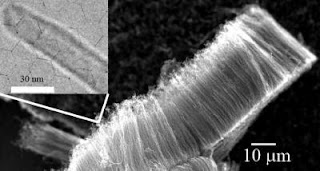Most people would like to be able to charge their cell phones and other personal electronics quickly and not too often. A recent discovery made by UC San Diego engineers could lead to carbon nanotube-based supercapacitors that could do just this.
In recent research, published in Applied Physics Letters, Prabhakar Bandaru, a professor in the UCSD Department of Mechanical and Aerospace Engineering, along with graduate student Mark Hoefer, have found that artificially introduced defects in nanotubes can aid the development of supercapacitors.
"While batteries have large storage capacity, they take a long time to charge; while electrostatic capacitors can charge quickly but typically have limited capacity. However, supercapacitors/electrochemical capacitors incorporate the advantages of both," Bandaru said.
The researchers think that the energy density and power density obtained through their work could be practically higher than existing capacitor configurations which suffer from problems associated with poor reliability, cost, and poor electrical characteristics.
Bandaru and Hoefer hope that their research could have major implications in the area of energy storage, a pertinent topic of today. "We hope that our research will spark future interest in utilizing CNTs as electrodes in charge storage devices with greater energy and power densities," Hoefer said.
While more research still needs to be done to figure out potential applications from this discovery, the engineers suggest that this research could lead to wide variety of commercial applications, and hope that more scientists and engineers will be compelled to work in this area, Bandaru said.
Meanwhile, Hoefer said this type of research will help fuel his future engineering career.
"It is remarkable how current tools and devices are becoming increasing more efficient and yet smaller due to discoveries made at the nanoscale," he said. "My time spent investigating CNTs and their potential uses at the Jacobs School will prepare me for my career, since future research will continue the trend of miniaturization while increasing efficiency." ###
"Determination and enhancement of the capacitance contributions in carbon nanotube based electrode systems," Applied Physics Letters. M. Hoefer and P.R. Bandaru, Department of Mechanical and Aerospace Engineering, Materials Science Program, University of California, San Diego.
Contact: Andrea Siedsma asiedsma@soe.ucsd.edu 858-822-0899 University of California - San Diego
















No comments:
Post a Comment